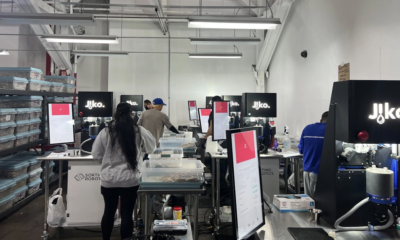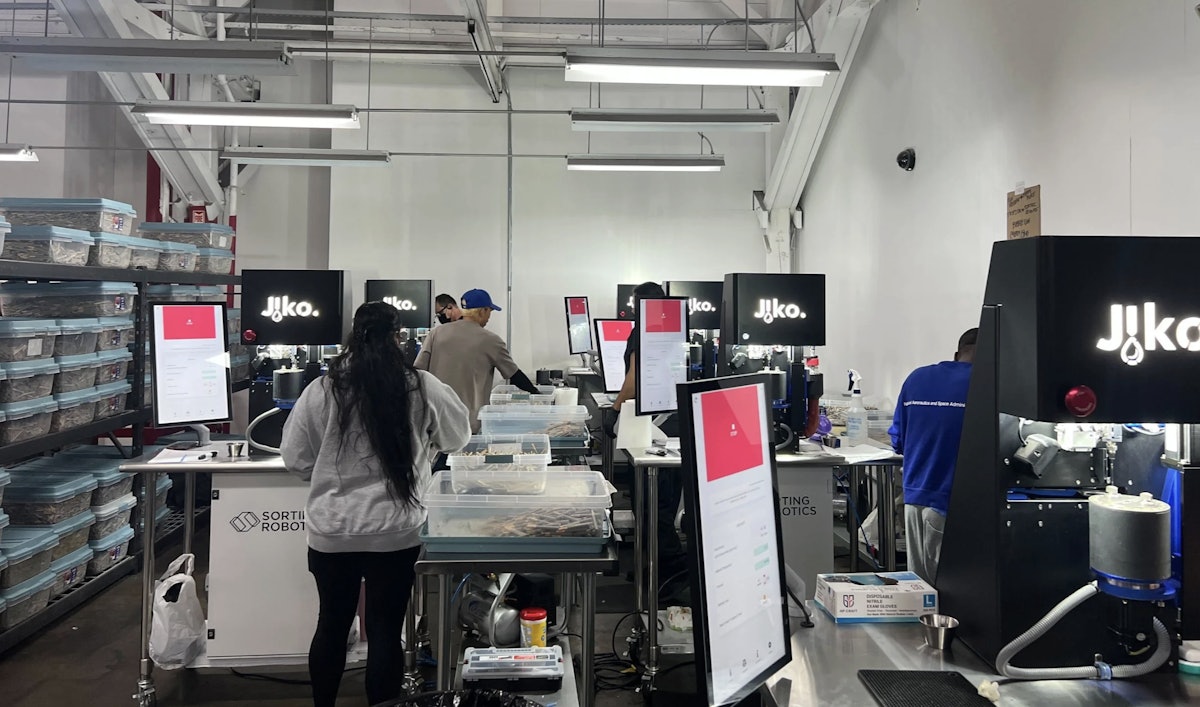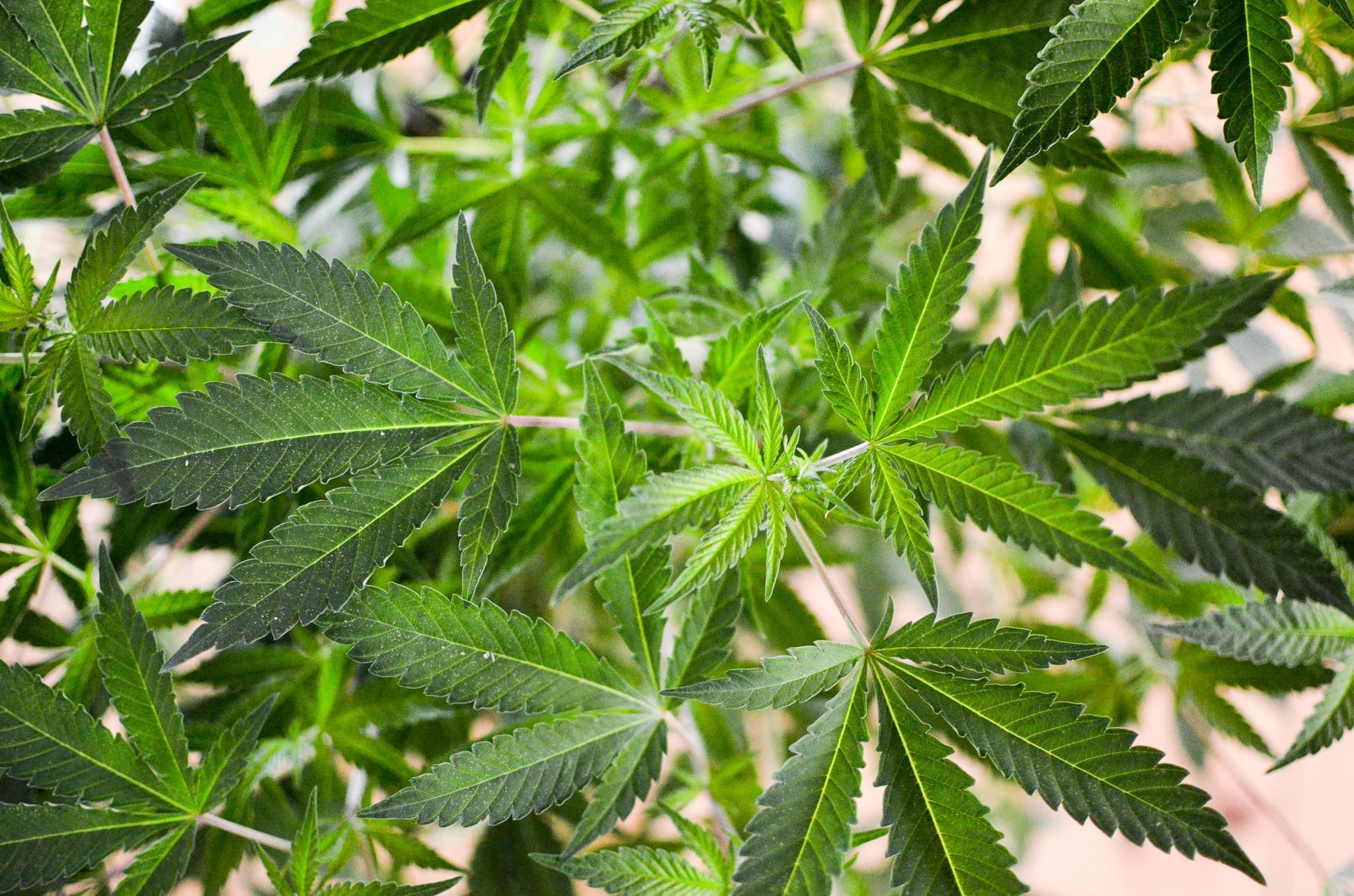featured
How America Accidentally Legalized Lab Cannabis
Published
5 hours agoon

…and still doesn’t know what to do about it
In 2018, Congress slipped a decimal point into law and, without meaning to, opened the gates to a new cannabis economy.
The Farm Bill’s definition of hemp (any cannabis plant with less than 0.3% delta-9 THC on a dry weight basis) was supposed to revive rope, seed oil, and maybe a wellness aisle or two. Instead, it gave birth to lab-cooked cannabinoids.
As expected, some people noticed what lawmakers didn’t: if hemp is legal so long as its delta-9 stays under the line, you can plant acres of it, strip out the CBD, and nudge the molecules into other substances. Delta-8. Delta-10. THCP. THC-O.
A new chemistry of cannabis, far from the natural experience of burning the flower.
The best part for these brave entrepreneurs is that it’s sort of legal.
In prohibition strongholds like Texas, you can’t buy a joint of real weed, but you can walk into a strip-mall vape shop and pick up hemp-derived highs. As always, the cracks in substance-based prohibition design gave birth to new productive practices.
What began as a dry legal definition mutated into an alchemy business that, for years, sat on gas station counters, truck stops, and e-commerce sites. A black-light market hiding in plain sight.
By 2024, the “intoxicating hemp” sector had already grown into a $28 billion market.
The Politics of a Decimal Point
Mitch McConnell thought he was saving Kentucky farmers when he wrote hemp into the Farm Bill. He pictured fields of fiber, a patriotic revival of rope and grain. Kentucky’s line against cannabis was firm, but hemp… that seemed safe.
Six years later, his decimal point has grown teeth. House Republicans like Mary Miller now want hemp narrowed to “naturally occurring, non-intoxicating cannabinoids,” a surgical strike aimed straight at delta-8. In the Senate, Debbie Stabenow wants to count “total THC,” closing off the raw biomass trade altogether. Draft appropriations language circulating in D.C. would simply erase hemp-derived products from the map.
This is highly unlikely to happen, given that the hemp lobby has risen together with its market.
I was at an academic congress recently in Rio de Janeiro, where a UN bureaucrat explained that the U.S. government, with carbon credits, aimed to kick off an economy that would eventually lead to the formation of lobbyists defending the policy that created them. Eventually, this would lock the policy in, which would be good for the planet, since every serious climate scientist agrees that if we don’t change course, we will see increasingly dramatic climate events. The problem is that, unfortunately, it didn’t happen. Economic interests weren’t enough to create a strong lobby, and the carbon credit market suffered when political winds shifted.
This is a good anecdote to reflect on hemp, where practically the exact opposite happened: the state unintentionally created a business and, when governments decided it was time to put it to rest, lobbyists were already powerful enough to resist. This happened in Florida, for instance, where the unlikely alliance between an anti-cannabis governor and a well-funded hemp lobby triumphed over the (much criticized) AM3.
These aren’t moral crusades so much as power struggles. On one side, the hemp lobby: processors, retailers, and growers, especially in the South, where cannabis is still illegal and hemp jobs are real. On the other hand, licensed cannabis operators argue the loophole is eating their market alive.
In California, the opposite situation played out: under Gavin Newsom, hemp-derived products were pushed out. Collateral damage included organic hemp wellness companies, suddenly criminalized overnight, and families that relied on hemp-based products for treating particularly rare diseases.
Conservative governors in farm states defend hemp. Liberal governors in cannabis states call for bans. Some sort of crop politics was formed.
Alchemy
Step away from the Capitol and the absurdity sharpens. A pre-roll infused with Delta-8 sits between Slim Jims and lottery tickets. Neon gummies, branded like candy, fall into shopping baskets with beer and gasoline. Online, cartridges ship across state lines in glossy packaging, indistinguishable from sneakers or supplements.
Also read: When Cannabis Brands Blur Into Youth Culture, Regulators Notice: Lessons From Tobacco’s Past
Before Newsom banned hemp-derived products, there were dozens of cannabis retailers in California moving from the legal cannabis space into hemp, including some big companies that decided to launch online stores.
Dispensary culture comes wrapped in vault doors, compliance manuals, and QR-coded lab results. Gas station weed thrives on convenience. No budtenders, no seed-to-sale, no tax lines. In half the country, the only cannabis you can buy freely is the one conjured through alchemy.
States Strike Back, States Look Away
The map is jagged. Colorado, New York, and Washington pulled intoxicating hemp into their cannabis frameworks: if it gets you high, test it, label it, tax it. Texas lawmakers voted to ban delta-8, only for a veto to keep the market alive, if shaky. Florida’s governor vetoed restrictions outright, delivering hemp lobbyists their biggest win against the biggest cannabis companies in the state, which burned around $100 million trying to make adult-use legal.
Elsewhere, compromises abound: Alabama licenses edibles but bans smokables. Nebraska toyed with criminal penalties so vague they might have hit ordinary consumers.
The Farm Bill legalized the workaround. In dry states, consumers buy it because there’s nothing else. In legal states, some drift to it because it’s cheaper, untaxed, and unburdened by 280E. The main justification for prohibiting these products in legal states has been the systematic targeting of children and phony labeling.
The real issue isn’t the cannabinoid; it’s the complete lack of oversight. When lab-made or hemp-derived products are pumped out with no testing, no dosing accuracy, and no accountability, consumers get burned and the entire plant takes the hit. But it doesn’t have to be that way. THCa flower grown with real genetics, properly lab-tested, labeled, and sold transparently, can be just as safe and effective as any dispensary product. The difference isn’t hemp versus cannabis. The difference is standards versus chaos.
Prohibition Doesn’t Work
There’s another path. Experts agree that prohibiting a molecule is ridiculous: scientists haven’t even been able to describe every cannabinoid in the plant.
What we know is a drop; what we don’t know is an ocean.
Regulators could admit that cannabinoids are cannabinoids, whether coaxed from hemp or cut from cannabis. One framework, one set of standards, one tax regime. License the labs, test the batches, label them clearly, and tax rationally.
Of course, that would mean dragging gas station weed out of the neon blur and into the same daylight as dispensary flower. It needs conviction and guts because entrenched interests have already been created.
Editor’s Note: High Times believes in safe access to all forms of cannabis. That’s why our own THCa line is lab-tested, terp-rich flower, not gas station mystery products. If policymakers are serious about consumer safety, this is what the standard should look like.
Cover image made with AI

Author: mscannabiz.com
MScannaBIZ for all you Mississippi Cannabis News and Information.
You may like
-


Sorting Robotics Becomes Cannabis Manufacturing’s First True Systems Integrator
-


Wisconsin Senators Hold Hearing On GOP Leader’s New Medical Marijuana Legalization Bill
-


Tariffs And Visas Add To The Cannabis Industry’s Misery
-


Rhode Island Cannabis Chair Steps Down; Adult-Use Dispensary Awards Months Away
-


New Hampshire Lawmakers Announce Plans For Marijuana, Psychedelics And Hemp Bills For 2026 Session
-


Metrc Announces In-Person Events in New York to Prepare Licensees For Track-and-Trace Implementation
featured
Sorting Robotics Becomes Cannabis Manufacturing’s First True Systems Integrator
Published
42 minutes agoon
October 22, 2025
[PRESS RELEASE] – LOS ANGELES, Oct. 21, 2025 – Sorting Robotics, the premier industrial automation technology company for the cannabis industry, announced the launch of its Custom Integrations and Automation Service for cannabis manufacturers, making it the cannabis industry’s first true integrator.
For years, cannabis manufacturers have relied on a patchwork of machines, each built to handle a single step, none designed to work together. In mature industries like food or pharmaceuticals, integrators serve as the connective tissue between those systems, ensuring that data, machinery and service align. Until now, cannabis lacked that layer of coordination.
“Cannabis companies don’t just need machines; they need complete systems that evolve with them,” Sorting Robotics co-founder and CEO Nohtal Partansky said. “Our integration arm bridges the gap between automation and adaptation, so facilities can scale without being locked into rigid, one-size-fits-all solutions.”
Sorting Robotics’ new integration services combine classical automation and robotics engineering to design fully connected production lines for infused pre-rolls, packaging and more. By focusing on robotics, rather than fixed, single-use automation, the company delivers flexibility for producers managing constantly changing SKUs and product formats.
The company likens the approach to a software API for hardware. In software, APIs allow different tools to communicate seamlessly; in cannabis manufacturing, custom integration creates the mechanical equivalent: building workflows that connect hardware, data and operators into a cohesive system.
The company’s first integration projects include work with high-volume manufacturers producing more than 100,000 pre-rolls per day, where scalable, reliable automation is critical to efficiency and profitability.
This expansion comes on the heels of a period of exceptional growth for the pioneering cannabis robotics company, recently recognized on the 2025 Inc. 5000 list. Today, its advanced robotic systems are powering operations in more than 120 facilities across every legal cannabis market in the U.S. and Canada.
“The cannabis market has matured enough to demand real infrastructure,” Partansky said. “Integration isn’t about replacing people. Integration is about connecting systems so teams can focus on what really drives value.”
As the first dedicated integrator in cannabis manufacturing, Sorting Robotics aims to bring the same level of sophistication seen in pharma and food production to an industry ready for modernization without losing the flexibility that defines its growth.
To learn more about Sorting Robotics and its expansion into custom integrations and automation, visit SortingRobotics.com/Integrations.

Author: mscannabiz.com
MScannaBIZ for all you Mississippi Cannabis News and Information.
featured
Wisconsin Senators Hold Hearing On GOP Leader’s New Medical Marijuana Legalization Bill
Published
2 hours agoon
October 22, 2025
Wisconsin senators on Wednesday took up a newly filed Republican-led bill that would legalize medical marijuana in the state.
Just one week after Senate President Mary Felzkowski (R) and Sen. Patrick Testin (R) filed the legislation, members of the Senate Health Committee debated the proposal at a hearing, taking testimony from patients and other advocates.
An Assembly companion version was also filed by Assemblymember Patrick Snyder (R) and lawmakers, but it has not yet advanced in their chamber.
“Illness does not discriminate. It affects people from all walks of life. There is no doubt that each and every one of us knows someone that has suffered through an illness and struggled to find ways to make it through each day,” Testin said at the hearing, describing how his grandfather used medical cannabis to treat cancer symptoms decades ago. “While there are often medications that doctors can prescribe to help combat these illnesses, many come with side effects that can make living a normal life much more difficult.”
“In some cases, the only option for pain relief is to take opioids on a long-term basis, which can lead to a whole host of other challenges that already afflict our state and our residents,” he said. “However, there is an alternative.”
“Both red and blue states alike have been able to come together and recognize that this is a viable option for patients within their respective states, regardless of the partisan makeup of that that state,” the senator said. “Medicine is never a one-size-fits-all, and it’s time for Wisconsin to join the majority of the country and add another option, which may help patients find relief they need.”
Felzkowski shared her story of overcoming breast cancer, struggling with the side effects of opioids and other prescription medicines she was prescribed and then asking her oncologist what they thought about the idea of legalizing medical cannabis. The doctor told her that while marijuana is not a miracle cure, it’s another tool in the toolbox that could benefit many patients.
“Wisconsin is on an island surrounded by neighboring states that allow the use of medical cannabis products. These products are not for everyone—but for others that use opioids or other medications to treat their health condition, the side effects of these drugs can be debilitating,” the Senate president said. “Someone who suffers from a serious health condition should not have to make the choice to travel to another state or break the law so that they can try an alternative medicine for relief. Unfortunately, this is a position in which we put many Wisconsinites.”
Sen. Rachael Cabral-Guevara (R), chair of the Health Committee, said that, as a healthcare provider herself, she’s heard stories about the medical potential of cannabis “all the time.” And while some providers might not want to participate in a medical marijuana program, “there are many that do…because we know our patients are going and purchasing these products to manage their symptoms from other states.”
“I will also say, as someone that does prescribe medications, I would rather my patients be upfront and truthful on what products they’re using to manage their symptoms, than having to guess,” she said. “There are a lot of people that will not come out and be straightforward because they’re afraid of consequences, and I hope that this bill would eliminate that fear that people are using for medicinal purposes to manage their conditions, so that individuals who are prescribing can take that into consideration when thinking of dosing and contraindications.”
Pressed on the lack of employment protections for would-be medical marijuana patients in her legislation, Felzkowski said “everything that’s done in this bill is to hopefully to get it to pass through both houses.”
“I always say if I was queen for a day, I’d probably write a whole bunch of legislation differently,” she said. “But we have to make sure that everybody in our caucuses are comfortable with legislation.”
One witness who testified was Norah Lowe, a 17-year-old with a rare neurodevelopment condition known as Rett syndrome, who spoke to members through computer audio given her associated speech impairment.
“My friends with Rett syndrome who use medical cannabis actually sleep through the night and see extensive relief from painful muscle spasms. Why can’t I get relief from mine?” she asked. “My friends who have access to cannabis see profound improvements in their therapies and communication skills. Why can’t I experience the same types of advancement of skills?”
She was accompanied by her mother, Megan Lowe, who also spoke to the benefits of medical marijuana that she experienced while going through treatment for breast cancer.
“I used it to find relief from my hot flashes, my insomnia, my crippling anxiety, my neuropathy, my restless legs, my itchy skin—the list goes on,” she said. “Cannabis made my cancer treatments and recovery bearable so that I could go back and returning to caregiving for her.”
Wisconsin’s GOP Assembly speaker said earlier this month that he hopes lawmakers in the state can “find a consensus” on legislation to legalize medical marijuana. But he added that the new cannabis bill filed by his Republican leadership counterpart in the Senate is “unlikely” to pass his chamber because it is “way too broad and way too wide-ranging.”
As the 2025 session was set to get underway, Felzkowski said she was “hoping to have a conversation” in the legislature about legalizing medical marijuana this year—though the Republican Assembly speaker still represented “an obstacle,” she added.
The Senate leader has previously sponsored medical cannabis legislation in past sessions, formally introduced the new legislation.
Here are the key provisions of the Senate president’s latest medical marijuana bill.
- Qualifying conditions for patients would include cancer, HIV/AIDS, post-traumatic stress disorder, seizures or epilepsy, glaucoma, severe chronic pain, severe muscle spasms, severe chronic nausea, Alzheimer’s disease, Parkinson’s disease, amyotrophic lateral sclerosis, multiple sclerosis, inflammatory bowel disease, chronic motor or vocal tic disorder, Tourette syndrome and any terminal illness with a probable life expectancy of less than one year.
- Allowable forms of medical cannabis products would include concentrates, oils, tinctures, edibles, pills, topical forms, gels, creams, vapors, patches, liquids and forms administered by a nebulizer. Cannabis in a form that could be smoked would not be allowed.
- Home cultivation would not be allowed.
- Patients could designate up to three caregivers who could purchase and possess medical cannabis products on the their behalf.
- Patient and caregiver registrations would last for two years and could then be renewed. The annual fee would be $20, and people could have their registrations rescinded for being convicted of a felony or for violating certain drug law.
- Dispensaries would be required to employ pharmacists who would need to consult with patients or caregivers and recommend a daily dosage. A patient getting medical marijuana for the first time could get up to a 30-day supply and on subsequent visits could receive up to a 90-day supply.
- Patients’ use of medical cannabis would need to be recorded in the state’s Prescription Drug Monitoring Program.
- The bill would establish parental rights and housing discrimination protections for medical cannabis patients and caregivers, but it would allow employers to fire or refuse to hire workers based on their use of medical marijuana.
- Patients and caregivers could only possess medical cannabis at their own residences or when traveling between dispensaries and their homes. There would be a $25 civil penalty for failing to carry a registry ID card when possessing medical marijuana or for possessing cannabis at locations other than those specified as being allowed.
- Medical cannabis products would be exempt from sales taxes.
- The state would license cultivation, processing, laboratory and dispensary businesses, subject to certain residency and eligibility requirements and annual fees and penalties for violations.
- A new Office of Medical Cannabis Regulation would be established under the Department of Health Services to oversee the patient and caregiver registry and dispensaries. Its director would be appointed by the governor.
- The Department of Agriculture, Trade and Consumer Protection would oversee and regulate cannabis cultivation, processing and testing.
- Localities would not be able to regulate medical cannabis businesses or restrict their zoning.
Meanwhile, a Republican candidate for governor of Wisconsin said in July that he was “open to considering different opportunities” when it comes to legalizing medical or adult-use marijuana in the state, though he has provided little in the way of specifics so far.
On the Democratic side, current Gov. Tony Evers (D), who supports legalizing cannabis, will not be seeking re-election. But he said in June that if his party can take control of the legislature, the state can “finally” legalize marijuana so that residents don’t have to go to neighboring Illinois to visit its adult-use market.
Separately in June, a poll from Marquette Law School found that two in three Wisconsin voters support legalizing marijuana.
The survey found that support for cannabis reform has generally increased over time since the institution first started tracking public opinion on legalization in 2013, with 67 percent of voters now backing the policy change. That’s 17 percentage points higher than the 2013 results.
Democrats are the most likely to favor legalizing cannabis, at 88 percent, followed by independents (79 percent). However, a majority of Republicans (56 percent) said they’re still opposed to adult-use legalization.
Underscoring the importance of party control, the state’s Republican-controlled Senate and Assembly this summer rejected another attempt to legalize marijuana, defeating amendments to budget legislation that would have ended prohibition in the state and established new medical and recreational cannabis programs.
Evers has routinely attempted to change that policy as part of his budget requests—and Democratic leaders have similarly pushed for reform.
Republicans in the legislature also cut the marijuana provisions from a state budget proposal in May, as they’ve done in past sessions.
Despite Republicans’ move to cut legalization from the budget legislation, party leaders recently acknowledged that the debate over medical marijuana legalization is “not going to go away,” and there’s hope it can be resolved this session.
—
Marijuana Moment is tracking hundreds of cannabis, psychedelics and drug policy bills in state legislatures and Congress this year. Patreon supporters pledging at least $25/month get access to our interactive maps, charts and hearing calendar so they don’t miss any developments.![]()
Learn more about our marijuana bill tracker and become a supporter on Patreon to get access.
—
“I don’t think anyone is naive enough to think that marijuana and THC products aren’t present in the state of Wisconsin when they are readily available over state lines, so I think we need to come to an answer on this,” Assembly Majority Leader Rep. Tyler August (R) said in February. “I’m hopeful that we can.”
“If we’re going to call it medical marijuana, it needs to be treated like a pharmaceutical. But the marijuana debate is going to be something that is not going to go away,” Sen. Dan Feyen (R), the assistant majority leader, said at the time. “The margins are tighter.”
There have been repeated attempts to legalize medical marijuana in the legislature over recent years, including the introduction of legislation from Assembly Speaker Robin Vos (R) that called for a limited program facilitated through state-run dispensaries. That proved controversial among his Republican colleagues, however, and it ultimately stalled out last year.
Evers previewed his plan to include marijuana legalization in his budget in January, while also arguing that residents of the state should be allowed to propose new laws by putting binding questions on the ballot—citing the fact that issues such as cannabis reform enjoy sizable bipartisan support while the GOP-controlled legislature has repeatedly refused to act.
Previously, in 2022, the governor signed an executive order to convene a special legislative session with the specific goal of giving people the right to put citizen initiatives on the ballot, raising hopes among advocates that cannabis legalization could eventually be decided by voters. The GOP legislature did not adopt the proposal, however.
Evers said in December that marijuana reform is one of several key priorities the state should pursue in the 2025 session, as lawmakers work with a budget surplus.
Days after he made the remarks, a survey found the reform would be welcomed by voters in rural parts of the state. Nearly two thirds (65 percent) said they support legalizing cannabis.
Last May, the governor said he was “hopeful” that the November 2024 election would lead to Democratic control of the legislature, in part because he argued it would position the state to finally legalize cannabis.
“We’ve been working hard over the last five years, several budgets, to make that happen,” he said at the time. “I know we’re surrounded by states with recreational marijuana, and we’re going to continue to do it.”
A Wisconsin Democratic Assemblymember tried to force a vote on a medical cannabis compromise proposal last year, as an amendment to an unrelated kratom bill, but he told Marijuana Moment he suspects leadership intentionally pulled that legislation from the agenda at the last minute to avoid a showdown on the issue.
Meanwhile, the state Department of Revenue released a fiscal estimate of the economic impact of a legalization bill from then-Sen. Melissa Agard (D) in 2023, projecting that the reform would generate nearly $170 million annually in tax revenue.
A legislative analysis requested by lawmakers estimated that Wisconsin residents spent more than $121 million on cannabis in Illinois alone in 2022, contributing $36 million in tax revenue to the neighboring state.
Evers and other Democrats have since at least last January insisted that they would be willing to enact a modest medical marijuana program, even if they’d prefer more comprehensive reform.
Photo courtesy of Philip Steffan.

Author: mscannabiz.com
MScannaBIZ for all you Mississippi Cannabis News and Information.
featured
Tariffs And Visas Add To The Cannabis Industry’s Misery
Published
3 hours agoon
October 22, 2025
Tariffs And Visa Add To The Cannabis Industry’s Misery, squeezing profits, talent, and innovation nationwide.
The U.S. legal cannabis industry has been suffering over the last two years under an indecisive federal government — and now it’s getting squeezed from two unexpected angles: Tariffs and Visas add to the cannabis industry’s misery. For businesses and workers alike, what once looked like a budding success story is showing greater turbulence.
The first punch comes via international trade policy. Many cannabis-adjacent businesses — from vape cartridge manufacturers to packaging suppliers and cultivation equipment importers — rely heavily on overseas inputs, especially from China. Recent U.S. tariffs on Chinese goods — in some cases raising rates to 30–50% or more — have forced costs up, and the ripple is hitting weed-industry players hard.
RELATED: The VFW Stands Up For Marijuana

What makes this especially tough for cannabis businesses: margins are already razor-thin, regulatory burdens are high, and the domestic supply chain just isn’t built out. Switching suppliers takes time; finding U.S.-based manufacturers meeting regulatory compliance is even harder.
Now consider the human side of the workforce. The immigration and “visa” side of the equation rarely gets front-page attention in cannabis, but it’s quietly important. The federal government still classifies cannabis (marijuana) as a Schedule I controlled substance, despite many states legalizing it. That creates complications for foreign nationals trying to work in or invest in cannabis-related businesses.
For example, non-U.S. citizens on visas or applying for visas risk denial or revocation if they have past cannabis use, or if they’re working or investing in the cannabis industry—even when it’s legal in the state. This means companies would otherwise recruit international talent, or rely on global investment, may find restrictions.
RELATED: Cannabis Mogul Appointed Ambassador To Middle East Country
At the same time, broader visa policy changes are making the environment more uncertain. Recent shifts on H-1B visas, fees, and work permits are complicating cross-border mobility for skilled workers.
The combination of higher input costs and a more restrictive workforce/immigration pipeline is a double whammy for cannabis entrepreneurs. It means:
- Higher retail prices or slimmer margins
- Supply chain disruption (imports delayed, domestic alternatives still catching up)
- Caution around hiring international talent or tapping global investment due to immigration uncertainty
- Potential slowdown in growth or innovation as more resources are diverted to coping
For millennial cannabis consumers and industry watchers: yes, you might start seeing slightly steeper prices or less product innovation. And for workers and founders: borders, visas, and trade policy are no longer side conversations — they’re central to whether the business thrives.
In short: the cannabis boom isn’t immune to macroeconomics and immigration policy. If anything, it’s among the more vulnerable sectors, since it straddles imports, regulation, and workforce mobility all at once.

Author: mscannabiz.com
MScannaBIZ for all you Mississippi Cannabis News and Information.

Sorting Robotics Becomes Cannabis Manufacturing’s First True Systems Integrator

Wisconsin Senators Hold Hearing On GOP Leader’s New Medical Marijuana Legalization Bill

Tariffs And Visas Add To The Cannabis Industry’s Misery

Rhode Island Cannabis Chair Steps Down; Adult-Use Dispensary Awards Months Away

How America Accidentally Legalized Lab Cannabis

New Hampshire Lawmakers Announce Plans For Marijuana, Psychedelics And Hemp Bills For 2026 Session

Metrc Announces In-Person Events in New York to Prepare Licensees For Track-and-Trace Implementation

Top Rhode Island Marijuana Regulator Steps Down Ahead Of Possible Campaign For Attorney General

Lifestyle Brand Cookies Launches in Brazil With Premium Wellness Products

Alcohol companies lobby Congress on cannabis drinks (Newsletter: October 22, 2025)

Millennials Are Spending Big on Luxury Travel

Ohio Lawmakers Advance Bill To Scale Back Voter-Approved Marijuana Law And Impose Hemp Regulations

Data Confirms Cannabis Is Safer Than Alcohol

American Council of Cannabis Medicine Unveils Major Industry Initiative to Expand Medical Cannabis Access

Scientists Develop New Class Of CBD Using A Common Kitchen Spice—Not Cannabis

Evidence About Burning Mouth Syndrome And Cannabinoids

Raw Garden Acquires ‘California Love’ to Grow Clean Cannabis Movement

Rhode Island Marijuana Officials Approve Timeline For Awarding New Dispensary Licenses

‘Rent-a-License’ Scheme Highlights New York Cannabis’s Track-and-Trace Problem

Alcohol Industry Steps Up Lobbying On Hemp Drinks As Congress Debates THC Ban

Cannabis Mogul Appointed Ambassador To Middle East Country

Pennsylvania Senators Approve Bipartisan Cannabis Bill To Create New Regulatory Body

Ahead Of New Jersey Governor Election, GOP Candidate’s Comments On Marijuana As A ‘Gateway Drug’ Resurface

Urgent Action Needed To End US Marijuana Arrests

Alert: Department of Cannabis Control updates data dashboards with full data for 2023

Connecticut Appoints The US’s First Cannabis Ombudsperson – Yes there is a pun in there and I’m Sure Erin Kirk Is Going To Hear It More Than Once!

5 best CBD creams of 2024 by Leafly

Recreational cannabis on ballot for third time in South Dakota

EU initiative begins bid to open access to psychedelic therapies
New Study Analyzes the Effects of THCV, CBD on Weight Loss

Free delta-9 gummies from Bay Smokes

5 best autoflower seed banks of 2024 by Leafly

Discover New York’s dankest cannabis brands [September 2024]

May 2024 Leafly HighLight: Pink Runtz strain

Press Release: CANNRA Calls for Farm Bill to Clarify Existing State Authority to Regulate Hemp Products

5 best THC drinks of 2024 by Leafly

Local medical cannabis dispensary reacts to MSDH pulling Rapid Analytics License – WLBT

6 best CBD gummies of 2024 by Leafly

Curaleaf Start Process Of Getting Their Claws Into The UK’s National Health System – With Former MP (Resigned Today 30/5/24) As The Front Man

Horn Lake denies cannabis dispensary request to allow sale of drug paraphernalia and Sunday sales | News

5 best delta-9 THC gummies of 2024 by Leafly

Mississippi city official pleads guilty to selling fake CBD products

The Daily Hit: October 2, 2024

Nevada CCB to Accept Applications for Cannabis Establishments in White Pine County – “Only one cultivation and one production license will be awarded in White Pine County”

5 best THCA flower of 2024 by Leafly

Weekly Update: Monday, May 13, 2024 including, New Guide for Renewals & May Board meeting application deadline

6 best hemp pre-rolls of 2024 by Leafly

PRESS RELEASE : Justice Department Submits Proposed Regulation to Reschedule Marijuana
Trending
-

 California Cannabis Updates1 year ago
California Cannabis Updates1 year agoAlert: Department of Cannabis Control updates data dashboards with full data for 2023
-

 Breaking News1 year ago
Breaking News1 year agoConnecticut Appoints The US’s First Cannabis Ombudsperson – Yes there is a pun in there and I’m Sure Erin Kirk Is Going To Hear It More Than Once!
-

 best list1 year ago
best list1 year ago5 best CBD creams of 2024 by Leafly
-

 Business1 year ago
Business1 year agoRecreational cannabis on ballot for third time in South Dakota
-

 Business1 year ago
Business1 year agoEU initiative begins bid to open access to psychedelic therapies
-

 cbd1 year ago
cbd1 year agoNew Study Analyzes the Effects of THCV, CBD on Weight Loss
-

 Bay Smokes1 year ago
Bay Smokes1 year agoFree delta-9 gummies from Bay Smokes
-

 autoflower seeds1 year ago
autoflower seeds1 year ago5 best autoflower seed banks of 2024 by Leafly



